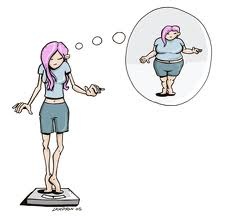Understanding and Overcoming Eating Disorders
Introduction
Song on Anorexia Nervosa
www.youtube.com/watch?v=wECFdIOvaCo&list=PLYEhyAvxUjMqs8cXT0Gh_k5jKEW0tuzwo&index=1
What are Eating Disorders?
Eating disorders are characterized by a persistent disturbance of eating or eating-related behaviour that results in the altered consumption or absorption of food and that significantly impairs physical health or psychosocial functioning.
Diagnostic criteria are provided for pica, rumination disorder, avoidant/restrictive food intake disorder, anorexia nervosa, bulimia nervosa, and binge-eating disorder (DSM V, 2013, p. 329).
According to National Institute of Mental Health: The eating disorders anorexia nervosa, bulimia nervosa, and binge-eating disorder, and their variants, all feature serious disturbances in eating behaviour and weight regulation. They are associated with a wide range of adverse psychological, physical, and social consequences.
A person with an eating disorder may start out just eating smaller or larger amounts of food, but at some point, their urge to eat less or more spirals out of control. Severe distress or concern about body weight or shape, or extreme efforts to manage weight or food intake, also may characterize an eating disorder.
Eating disorders are real, treatable medical illnesses. They frequently coexist with other illnesses such as depression, substance abuse, or anxiety disorders.
Other symptoms can become life-threatening if a person does not receive treatment, which is reflected by anorexia being associated with the highest mortality rate of any psychiatric disorder.
Eating disorders affect both genders, although rates among women and girls are 2½ times greater than among men and boys.
Eating disorders frequently appear during the teen years or young adulthood but also may develop during childhood or later in life.
Types of Eating Disorders include the following:
- Rumination Disorder
- Avoidant/Restrictive Food Intake Disorder
- Anorexia Nervosa
- Bulimia Nervosa
- Binge-eating Disorder
This article focuses on the eating disorders Anorexia Nervosa and Bulimia Nervosa.
Individuals who suffer with Anorexia Nervosa believe they’re fat even when they’re dangerously thin and restrict their eating to the point of starvation.
Individuals who suffer with Bulimia Nervosa eat excessive amounts of food, then purge by making themselves vomit or using laxatives.
The Signs and Symptoms of Eating Disorders
Anorexia Nervosa
- Restriction of energy intake relative to requirements, leading to a significantly low body weight in the context of age, sex, developmental trajectory, and physical health. Significantly low weight is defined as a weight that is less than minimally normal or, for children and adolescents, less than that minimally expected.
- Intense fear of gaining weight or of becoming fat or persistent behaviour that interferes with weight gain, even though at a significantly low weight.
- Disturbance in the way in which one’s body weight or shape is experienced, undue influence of body weight or shape on self-evaluation, or persistent lack of recognition of the seriousness of the current low body weight.
Bulimia Nervosa
- Recurrent episodes of binge eating. An episode of binge eating is characterized by both of the following:
- Eating, in a discrete period of time (e.g., within any 2-hour period), an amount of food that is definitely larger than what most individuals would eat in a similar period of time under similar circumstances.
- A sense of lack of control over eating during the episode (e.g., a feeling that one cannot stop eating or control what or how much one is eating).
- Recurrent inappropriate compensatory behaviours in order to prevent weight gain, such as self-induced vomiting; misuse of laxatives, diuretics, or other medications; fasting; or excessive exercise.
- The binge eating and inappropriate compensatory behaviours both occur, on average, at least once a week for 3 months.
- Self-evaluation is unduly influenced by body shape and weight.
- The disturbance does not occur exclusively during episodes of anorexia nervosa.
Causes of or Risk Factors for Eating Disorders
Eating disorders frequently appear during the teen years or young adulthood but may also develop during childhood or later in life. These disorders affect both genders, although rates among women are higher than among men. Like women who have eating disorders, men also have a distorted sense of body image. For example, men may have muscle dysmorphia, a type of disorder marked by an extreme concern with becoming more muscular.
Researchers are finding that eating disorders are caused by a complex interaction of genetic, biological, behavioral, psychological, and social factors. Researchers are using the latest technology and science to better understand eating disorders.
One approach involves the study of human genes. Eating disorders run in families. Researchers are working to identify DNA variations that are linked to the increased risk of developing eating disorders.
Brain imaging studies are also providing a better understanding of eating disorders. For example, researchers have found differences in patterns of brain activity in women with eating disorders in comparison with healthy women. This kind of research can help guide the development of new means of diagnosis and treatment of eating disorders.
Effects of Eating Disorders
The quality of a person’s life is deeply impacted by eating disorders. One’s relationships, physical well-being and day to day living are affected by eating disorders. Many more effects and physical hazards are experienced by persons suffering with the illness. Because the body needs food to function, starvation can affect most organ systems. The following are some of the effects and physical hazards of the eating disorders anorexia and bulimia.
- Amenorrhea – loss of menstrual cycle in females.
- Barrett’s Oesophagus – associated with Cancer of the oesophagus.
- Blood Sugar level disruptions.
- Low Blood sugar can indicate problems with the liver or kidneys and can lead to neurological and mental deterioration.
- Elevated Blood Sugar can lead to diabetes, liver and kidney shut down, circulatory and immune system problems.
- Chronic Fatigue Syndrome.
- Dehydration – caused by lack of intake of fluids in the body.
- Dental problems – erosion of tooth enamel from vomiting in the case of Bulimia.
- Depression – caused by physiological factors such as electrolyte imbalances, hormone and vitamin deficiencies, malnutrition and dehydration. Depression can also be caused by living with eating disorder behaviours.
- Diabetes – high blood sugar as a result of low production of insulin.
- Digestive difficulties – deficiency in digestive enzymes leading to inability to digest food.
- Dry skin and hair, brittle hair and nails, hair loss – caused by vitamin and mineral deficiencies, malnutrition and dehydration.
- Electrolyte Imbalances – can lead to heart problems and heart attacks.
- High Blood Pressure – can cause vision impairment, thickening of the heart muscle, kidney failure and brain damage.
- Hyperactivity.
- Impaired Neuromuscular Function – due to vitamin and mineral deficiencies.
- Increased or decreased bowel movements.
- Infertility – caused by loss of menstrual cycle.
- Insomnia – having problems falling and/or staying asleep.
- Iron Deficiency/Anaemia – causing heart palpitations and shortness of breath.
- Kidney Infection and failure – due to vitamin deficiencies, dehydration and low blood pressure.
- Lanugo – soft downy hair on face, back and arms – produced by the body during periods of starvation in order to keep warm.
- Liver failure – caused by fasting.
- Low Blood Pressure – caused by lowered body temperature, dehydration and malnutrition.
- Lowered Body Temperature – caused by loss of healthy insulating fat and low blood pressure.
- Muscle Atrophy – wasting away of muscle due to the body feeding off itself.
- Osteoporosis – thinning of the bones due to depletion of calcium and bone protein, predisposing to fractures.
- Peptic Ulcers – caused by increased stomach acids.
- Pregnancy problems – potential of high-risk pregnancies, miscarriage, still born babies and risk of baby born with birth defects due to vitamin deficiencies.
- Seizures – may be caused by dehydration.
- Tearing of Oesophagus – caused by self-induced vomiting in the case of Bulimia.
- Weakness and Fatigue – caused by poor eating habits, electrolyte imbalances, vitamin and mineral deficiencies, depression, malnutrition and heart problems.
It is of paramount importance to know that many of the aforementioned hazards of Anorexia and Bulimia can be fatal.
Treatment for Eating Disorders
Psycho-education:
Psycho-education refers to the process of providing education and information to those seeking or receiving mental health services and their family members.
Psycho-education’s goal is to help people better understand their disorder(s). It is commonly known that persons who thoroughly understand the challenges they face and have knowledge of their personal coping ability, internal and external resources, and their own areas of strength are often better able to address difficulties, feel more in control of the disorder(s), and have a greater internal capacity to work toward mental and emotional well-being.
Psycho-education helps as whether administered in a clinical, school, or hospital setting or through the telephone or Internet, it often leads to increased compliance with treatment regimens. When people who have been diagnosed with a mental health condition such as eating disorders are able to understand what the diagnosis means, they are more likely to view their illnesses as treatable conditions rather than shameful diagnoses indicating they are “crazy.” In addition, family involvement in psycho-education can also improve compliance and ensure that a person experiencing mental health concerns is given adequate support while they receive treatment.
In addition to helping those diagnosed with mental health concerns better understand the issues they are addressing, psycho-education also plays a vital role in the destigmatization of mental health conditions. As psycho-education does much to inform about the true nature of mental and emotional concerns, it is an important aspect of this goal.
Behavioural Activities:
- Mechanical Eating,
- Delay and Distraction,
- Environmental Control and
- Coping Phrases
Cognitive Activities:
- Exploring the relationship between thoughts, situational triggers and affect,
- Exploring evidence and challenging cognitive distortions,
- Exploring underlying beliefs and assumptions and
- Behavioural experiments.
Spiritual Activities:
- Knowing one’s identity in Christ
- Exploring the scriptures that assert one’s self-worth,
- Positive self-confession and affirmation
- Daily Bible study and memorizing scripture verses, meditation, and prayer
- Praise and worship
Self-Help and Coping
It is of paramount important for persons suffering with eating disorder to:
- learn to manage their stress,
- tap into their resources, and support system
- have proper nutrition,
- take vitamins and supplements,
- keep a diary.
- Engage in a hobby
- love oneself
Avoiding Relapse
To avoid relapse it is necessary for sufferers of eating disorders not only to receive treatment but also to work towards maintaining the progress made during treatment. Especially paying close attention to the spiritual side which is often neglected. Asserting one’s identity in Christ and praising God for according to Genesis 1:26-27, He has made each one in His image and likeness; fearfully and wonderfully as expressed by David in Psalm 139:14, “I will praise thee; for I am fearfully and wonderfully made: marvellous are thy works; and that my soul knoweth right well.”
Conclusion
One does not have to be a victim of eating disorders or succumb to the illness. Help is available and there is hope for such persons. If you or someone you know are suffering for eating disorder and you need someone to talk to, please feel free to contact me. I will be happy to talk with you. You are not alone and you are in my prayers. Blessings!
References
American Psychiatric Association (2013). Diagnostic and Statistical Manual of Mental Disorders (5th Ed.). Washington, DC.
American Psychiatric Association. Eating disorders. Retrieved 9th October 2017 from: http://www.apa.org/topics/eating/
National Institute of Mental Health. Eating disorders. Retrieved 9th October 2017 from: https://www.nimh.nih.gov/health/topics/eating-disorders/index.shtml
National Institute of Mental Health. Eating disorders: about more than food. Retrieved 9th October 2017 from: http://www.nimh.nih.gov/health/publications/eating-disorders-new-trifold/index.shtml
Psychoeducation. Retrieved 9th October 2017 from: https://www.goodtherapy.org/blog/psychpedia/psychoeducation







